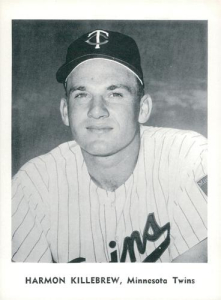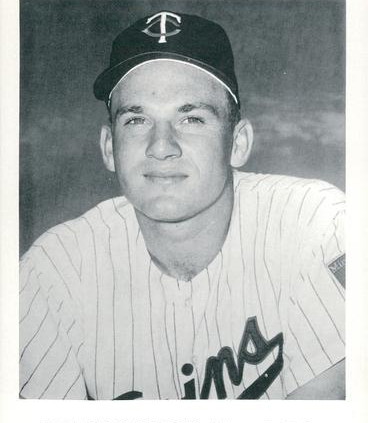September 3, 1971: Killebrew’s pinch-hit grand slam propels Twins to 9-4 win over A’s
 Harmon Killebrew’s sixth-inning pinch-hit grand slam launched the Minnesota Twins to a 9-4 victory over the Oakland Athletics in the first game of a doubleheader at Metropolitan Stadium.
Harmon Killebrew’s sixth-inning pinch-hit grand slam launched the Minnesota Twins to a 9-4 victory over the Oakland Athletics in the first game of a doubleheader at Metropolitan Stadium.
The first game of the twin bill was the makeup of a June 24 rainout. It preceded the scheduled Friday night game, which was designated Vida Blue Button Night. In a rare promotional event featuring a visiting team player,1 the Oakland phenom scheduled to pitch that night, the Twins handed out blue buttons that read “Roses are red, my clothes were blue, when I was there to see Vida Blue.”2
No attendance was announced for the makeup game, but the crowd swelled as fans arrived to watch the Twins take on the 21-year-old Oakland ace, who entered the evening with a 23-6 record, in the nightcap.3
Those who stayed late among the official announced crowd of 22,032 for the second game saw George Mitterwald smash a two-out ninth-inning solo home run into the left-field pavilion off Blue to lift Minnesota to a dramatic 2-1 victory and a sweep of the twin bill.
Those who arrived early enough were treated to Killebrew’s game-breaking shot in the opener after the A’s had taken an early lead.
Oakland jumped on Minnesota starter Jim Perry for two quick runs in the first, but it could have been more. Shortstop Bert Campaneris slapped a leadoff single to center, right fielder Reggie Jackson drilled a one-out double to left-center to drive in Campaneris, and third baseman Sal Bando singled to score Jackson. Trailing 2-0, Perry walked left fielder Adrian Garrett and catcher Gene Tenace to load the bases, but retired second baseman Dick Green on a groundout to short to avoid further damage.
The Twins quickly tied the score in the bottom of the inning with a little help. With one out, second baseman Rod Carew went to second when Oakland starting pitcher Diego Segui mishandled his grounder. After right fielder Tony Oliva drew a walk, first baseman Rich Reese singled to center to score Carew and move Oliva to third base. Left fielder Steve Brye forced Reese at second base, and Oliva scored. Segui picked Brye off first base to end the inning.
After Perry set the A’s down in the top of the second, shortstop Steve Braun singled and third baseman Eric Soderholm, making his major-league debut, grounded to third to force out Braun. Soderholm took second on Phil Roof’s single, then chugged around third on Perry’s single to right. The rookie challenged the wrong outfielder. Jackson, who led American League right fielders with 15 assists in 1971 and amassed 133 in his 21-year Hall of Fame career, delivered a bullet to Tenace at the plate to retire Soderholm and preserve the tie.
After Perry set the Athletics down in order in the third inning, Carew opened the bottom half with a fly ball to right that Jackson chased and appeared to lose as it sailed over his head. On third with a triple, Carew scored one out later on Reese’s groundout to first. Perry retired the A’s in order in the fourth, and Soderholm launched his first career home run, a 378-foot one-out solo shot, to stake Minnesota to a 4-2 lead. The rookie had clubbed 22 home runs for the Pacific Coast League’s Portland Beavers before his September call-up, “[b]ut I think I’ll remember this one better.”4
The Athletics trimmed the margin in half in the fifth. The speedy Campaneris beat out a bunt, swiped second (his 28th steal of the year), and scampered to third when Roof’s throw went wild. With one out, he scored on Jackson’s single off first baseman Reese’s mitt to trim Minnesota’s lead to 4-3.
Segui dispatched the Twins in the bottom of the fifth and in the sixth Tenace stroked a 381-foot one-out solo home run, his seventh of the season, to even the score at 4-4. Perry then surrendered a walk and two singles to load the bases, but again escaped a bases-loaded jam when he got Jackson to fly out to Brye in left field.
The outcome was determined in the bottom of the sixth. Brye slapped a one-out single behind second base, Braun doubled into the right-field corner, and Segui intentionally walked Soderholm. Twins manager Bill Rigney had planned to rest Killebrew in the opener against the right-handed Segui to be fresh for the nightcap against southpaw Blue.5 But with the score tied, the bases loaded, one out, and his catcher, Roof, due up, Rigney sent up Killebrew to pinch-hit.
Oakland manager Dick Williams countered by relieving Segui with another righty, former Twins pitcher Mudcat Grant, Killebrew’s teammate during the 1964-67 seasons. With the count 2-and-1, Grant offered up a fastball that Killebrew slugged 391 feet into Metropolitan Stadium’s left-field seats.6
The home run was Killebrew’s 19th of the season and the 506th of his career, the 10th most all-time then.7 He finished his 22-year Hall of Fame career with 573. It was the 10th grand slam of Killebrew’s career, the most among active major leaguers at the time. (He hit one more before wrapping up his career in 1975.) It was the third pinch hit home run of his career; he would hit four more. And it was the fifth pinch-hit grand slam by a Twin.8
Grant retired the next two hitters, but the Twins led 8-4.
When Mike Epstein led off the Athletics’ seventh with a single, Rigney replaced Perry with Tom Hall. Hall retired two Oakland hitters, then surrendered singles to Tenace and Green. With the bases loaded and two outs, the Twins dodged danger for the third time when Hall struck out pinch-hitter Joe Rudi, who wasn’t able to match Killebrew’s heroics.
With the lead intact, the Twins added an insurance run in the bottom of the seventh. Carew greeted relief pitcher Jim Roland with a leadoff single to center and moved to second on Oliva’s single to left. Two outs later, Braun drove in Carew with a single to right. After Roland plunked Soderholm with a pitch to load the bases, he struck out Mitterwald, who had replaced Roof at catcher, to end the inning with the Twins ahead 9-4.
That’s the way it ended. Hall, making his first appearance in 24 days because of Marine Reserve duty,9 retired Oakland in order in the eighth and ninth innings, striking out Bando and Garrett to end the game. Hall was awarded his seventh save. Perry improved to 16-14 for the season. Segui (9-6) was saddled with the loss. The game lasted 2 hours and 50 minutes.
With the sweep, Twins improved their record to 62-72, and staved off mathematical elimination in the American League West, while the Athletics fell to 88-49. However, the two teams were going in different directions. Minnesota, the two-time defending American League West champion, was eliminated from the race three nights later, and finished the 1971 season with a 74-86 record. The Athletics posted a 101-60 record to finish 16 games ahead of the nearest contender, Kansas City, and 26½ games ahead of the fifth-place Twins. The Athletics suffered a 3-0 sweep at the hands of the Baltimore Orioles in the AL Championship Series, but won the AL West five straight times (1971-75) and won three straight World Series titles (1972-74).
Sources
In addition to the sources cited in the Notes, the author accessed Retrosheet.org, Baseball-Almanac.com, Baseball-Reference.com, SABR.org, The Sporting News archive via Paper of Record, and the following articles on the SABR BioProject website:
Puerzer, Rich. “Vida Blue,” SABR BioProject, sabr.org/bioproj/person/397acf10
Leavengood, Ted. “Reggie Jackson,” SABR BioProject, sabr.org/bioproj/person/365acf13
Wancho, Joseph. “Mudcat Grant,” SABR BioProject, sabr.org/bioproj/person/ba7b1b4d
Wancho, Joseph, “Harmon Killebrew,” SABR BioProject, sabr.org/bioproj/person/55c51444
Wancho, Joseph. “Jim Perry,” SABR BioProject, sabr.org/bioproj/person/f7911858
Notes
1 Dan Stoneking, “Cliff-Edge Twins Still Hanging on,” Minneapolis Star, September 4, 1971: 7A. Stoneking wrote, “The Twins players said it didn’t bug them to have their front office stage such a promotion.” He quoted George Mitterwald: “The idea is to put fans in the park and that’s what it did. I wore one of those buttons before the game. So did my wife.”
2 Tom Briere, “Twins Homers top Blue, A’s,” Minneapolis Tribune, September 4, 1971: 13. Briere quoted the button and a home-made button worn by a Twins fan that stated, “To heck with Blue, I’m for the ’Brew.’”
3 Stoneking reported, “Everyone showing up at the ballpark (and most of the fans came late) wearing blue received a button commemorating Vida’s bid for a 24th victory.”
4 Briere: 16.
5 Briere: 16.
6 Briere: 13; Deane McGowen, “Roundup: Killebrew Puts Pinch on A’s with Slam,” New York Times, September 4, 1971: 6.
7 Killebrew had hit his 500th home run less than a month earlier, one of two he hit off Baltimore’s Mike Cuellar on August 8 at Metropolitan Stadium when he became just the 10th player to slug 500 career home runs.
8 Keith Sutton, “The Dream Hit: A Pinch Grand Slam,” 1972 Baseball Research Journal, sabr.org/research/dream-hit-pinch-grand-slam. Julio Becquer in 1961, Rich Reese in 1969 and 1970, and Rick Renick in 1970 had hit pinch-hit grand slams for the Twins. Only two players had accomplished the feat while the franchise was located in Washington, Cliff Bolton in 1934 and Hall of Fame Pitcher Early Wynn in 1946.
9 Stoneking.
Additional Stats
Minnesota Twins 9
Oakland Athletics 4
Game 1, DH
Metropolitan Stadium
Bloomington, MN
Box Score + PBP:
Corrections? Additions?
If you can help us improve this game story, contact us.


